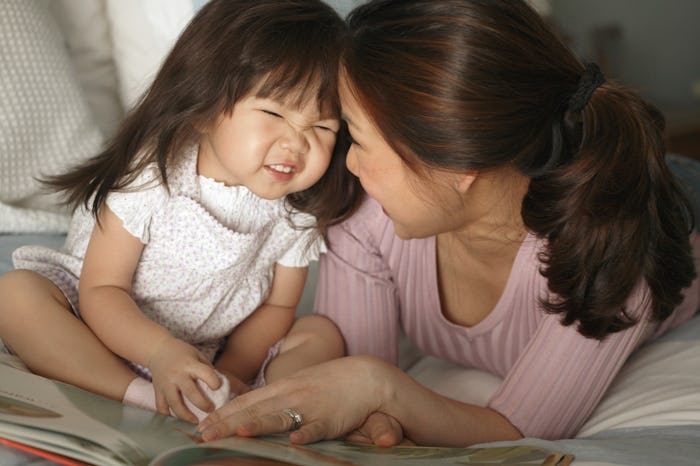Raising Kids

Reading Beloved Childhood Books To My Daughter Sometimes Means Editing On The Spot
Perhaps we remember stories not as they are, but as we’d like them to be.
A few months ago, my small-town public library held a used book sale as a fundraiser. I love perusing used bookstores to find unread gems, so I was excited to rummage through their stacks. After I scored a few books for myself, I began searching through their children’s section, hoping to find some fun books to add to my toddler daughter Dayanita’s library.
I spied Bedtime for Frances by Russell Hoban, one of my favorites from my own early 1980s childhood, and grabbed it for $1. Not only did I have nostalgia for this book, but its story about an incorrigible young badger who keeps trying to push off bed with her antics was perfect for Dayanita, who finds creative ways to delay her own bedtime.
That evening, I cracked open the book, eager to share the sweet, humorous story I remembered with my daughter. Soon, Dayanita was engrossed, and I could tell she saw herself reflected in mischievous Frances and her desire to ward off bedtime. But I was shocked with what I encountered next. When Frances wakes up her father with her umpteenth worry, he threatens her with a spanking.
I quickly improvised an edit. Instead of Frances asking if staying awake will result in a spanking, I swapped in a concern about being sleepy in school the next day,
But I had to improv again just a few pages later. This time a “whack and smack” of a moth’s wings against her windowsill “made Frances think of a spanking.” Mind racing, I replaced that with, “Rat and tat made Frances think of her jump rope.” Later that night, after putting Daya to bed, I even handwrote my edits into the book, so I wouldn’t be caught off guard the next time. And since my husband and Daya’s babysitter also read her stories, I wanted to ensure that they read this changed version.
There are many well-known and extreme examples of popular children’s books from the past that are, in fact, deeply racist. But I wondered how I had forgotten about Frances’s allusions to corporal punishment. Like many parents today, despite the fact (or perhaps because) I was raised by parents who did spank me, I don’t believe in spanking my child. (Studies show it’s ineffective as well.) Perhaps we remember stories not as they are, but as we’d like them to be.
I posted about the experience on my social media and some fellow mothers shared their own approaches to problematic books. Laura, a white mother of a 3-and-a-half year old and an 18-month-old, who is also the co-host of the pregnancy and parenting podcast Big Fat Positive, noted that she too has edited books on the spot. For example, when she encounters books that use male pronouns for dinosaurs and trucks, she alternates male and female pronouns so as not to reinforce gender stereotypes.
My edits will exist alongside the original, so that when my daughter can read, we can discuss why these changes are important to our lives and the lives of others.
Jessica, a biracial mother to 5-year-old twins, not only edits her childrens’ books, but if necessary, reimagines whole aspects of the narratives to make them more inclusive and progressive. “When we read Goldilocks, I include additional text where the bears talk about entitlement and destruction of property,” she says. Jessica seeks books that portray characters of color in realistic and nuanced ways. But she also believes “it's important for some of the classics to come into our times because they’re part of the broader lexicon shared across cultures. It is also important to empower children to tell the story in new ways or not at all.”
There are some books from my childhood that will have to remain only in my memories because of their fundamental message, such as Tikki Tikki Tembo by Arlene Mosel. This book depicts an East Asian village where first-born sons were given long names which, according to the story, are burdensome and impractical. This suggests the biased and false notion that only foreign long names are too difficult to bother to pronounce. I wrote previously for Romper about how when Dayanita was born, I wanted to give her a name that meaningfully reflected her Indian heritage — her name means compassion — and was undeterred by its length or the challenge it posed to pronounce.
But when a book I treasured can be saved, I’ve decided that, rather than feeling like I’m desecrating a classic, my approach will be to revise it. My goal: do so in a way that preserves the aspects I loved most, while ensuring that the story reflects the world as it is, or as I hope it will be one day. My edits will exist alongside the original, so that when my daughter can read, we can discuss why these changes are important to our lives and the lives of others.
Bedtime for Frances has become a bedtime story staple. And it turns out that Dayanita too has some helpful edits. Every time Frances makes one of her numerous requests to her parents meant to push off her bedtime, like, “May I watch television?” and “May I have some cake?” Dayanita reminds me that Frances should be saying “please.” Note taken.